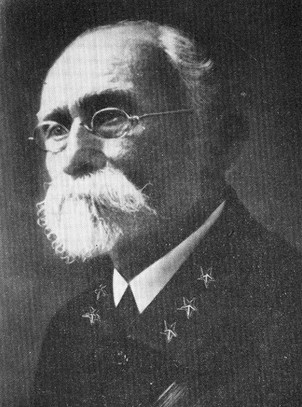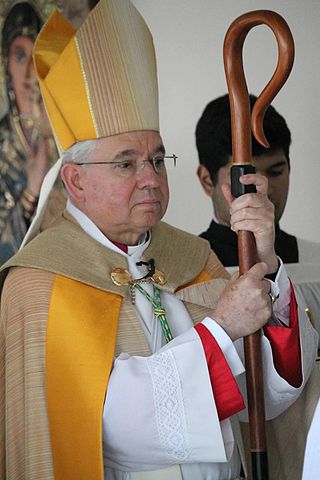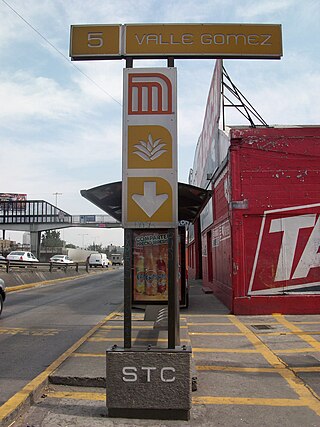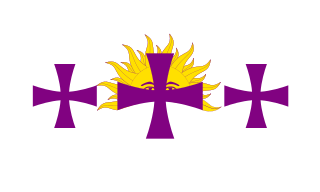
Heinrich Theodor Böll was a German writer. Considered one of Germany's foremost post-World War II writers, Böll is a recipient of the Georg Büchner Prize (1967) and the Nobel Prize for Literature (1972).

Johann Heinrich Hottinger was a Swiss philologist and theologian.

Gabriel Gregorio Fernando José María García Moreno y Morán de Butrón, was an Ecuadorian politician and aristocrat who twice served as President of Ecuador and was assassinated during his second term after being elected to a third. He is noted for his conservatism, Catholic religious perspective and rivalry with liberal strongman Eloy Alfaro. García Moreno was noted for efforts to economically and agriculturally advance Ecuador and for his staunch opposition to corruption.

Rónald Gómez Gómez is a retired Costa Rican football forward and manager. He is the current manager for Liga Nacional club Santa Lucía.

Máximo Gómez y Báez was a Dominican Generalissimo in Cuba's War of Independence (1895–1898). He was known for his controversial scorched-earth policy, which entailed dynamiting passenger trains and torching the Spanish loyalists' property and sugar plantations—including many owned by Americans. He greatly increased the efficacy of the attacks by torturing and killing not only Spanish soldiers, but also Spanish sympathizers. By the time the Spanish–American War broke out in April 1898, Gómez had the Spanish forces on the ropes. He refused to join forces with the Spanish in fighting off the United States, and he retired to a villa outside of Havana after the war's end.

José Horacio Gómez Velasco is a Mexican-born American prelate of the Catholic Church. He became the fifth Archbishop of Los Angeles in 2011. He served as Auxiliary Bishop of Denver from 2001 to 2004 and as Archbishop of San Antonio from 2004 to 2010.

In Zapotec cultures of Oaxaca, a muxe is a person assigned male at birth who dresses and behaves in ways otherwise associated with women; they may be seen as a third gender.
The Huichol language is an indigenous language of Mexico which belongs to the Uto-Aztecan language family. It is spoken by the ethnic group widely known as the Huichol, whose mountainous territory extends over portions of the Mexican states of Jalisco, San Luis Potosí, Nayarit, Zacatecas, and Durango, mostly in Jalisco. United States: La Habra, California; Houston, Texas. Under the 2003 Law on Indigenous Language Rights, the indigenous languages of Mexico along with Spanish are recognized as "national languages".

Gabriel Enrique Gómez Girón is a Panamanian former footballer who played as a defensive midfielder.
Guillermo Gómez y Rivera is a Spanish-Filipino multilingual author, historian, educator and linguistic scholar whose lifelong work has been devoted to the advocay to preserve Spanish culture as an "important element" of the Filipino identity.

Valle Gómez is a Mexico City Metro station within the limits of Gustavo A. Madero and Venustiano Carranza, in Mexico City. It is an underground station with two side platforms, served by Line 5, between Misterios and Consulado stations. Valle Gómez station serves the colonias of 7 de Noviembre and Valle Gómez; the station receives its name from the latter. The station's pictogram features an agave plant. Valle Gómez was opened on 1 July 1982, on the first day of the La Raza–Pantitlán service. In 2019, the station had an average daily ridership of 4,416 passengers, making it the 190th busiest station in the network and the least busy of the line.

Hispanidad is a Spanish term alluding to the group of people, countries, and communities that share the Spanish language and Hispanic culture. The term can have various, different implications and meanings depending on country of origin, socio-political views, and cultural background.

Servando Gómez Martínez, commonly referred to by his alias La Tuta for once being a teacher, is a Mexican drug lord and former leader of the Knights Templar Cartel, a criminal organization based in the state of Michoacán. He is a former leader and founder member of La Familia Michoacana drug cartel, the split-off group of the Knights Templar. On February 27, 2015, he was arrested by Mexican security forces in Morelia, Michoacán.

Jesús Rubén Darío Salazar Gómez is a Colombian prelate of the Catholic Church who was Metropolitan Archbishop of Bogotá from 2010 to 2020. He was made a cardinal in 2012. He was Metropolitan Archbishop of Barranquilla from 1999 to 2010.
Ali ibn Attiya ibn al-Zaqqaq was one of the great poets of Al-Andalus during the reign of the Almoravids. He was a Muslim from Banu Lakhm. His mother was the sister of fellow Andalusian poet, Ibn Khafaja, and there is scholarly dispute regarding his father. He was a disciple under philosopher Ibn Ṣîd de Badajoz.

Gustavo Raúl Gómez Portillo is a Paraguayan footballer who currently plays as a defender for and captains the Brazilian Serie A club Palmeiras and the Paraguay national team.
César Oudin was a French Hispanist, translator, paremiologist, grammarian and lexicographer.

Maximiliano "Maxi" Gómez González is a Uruguayan professional footballer who plays as a striker for Süper Lig club Trabzonspor and the Uruguay national team.

Sergio Gómez Martín is a Spanish professional footballer who plays as an attacking midfielder and left-back for Premier League club Manchester City.

Heinrich Federer was a Swiss writer and Catholic priest.















